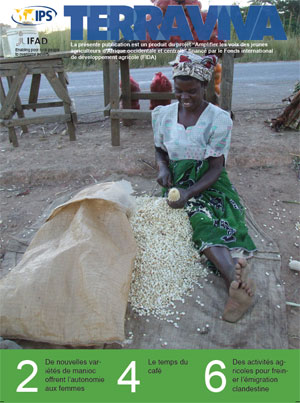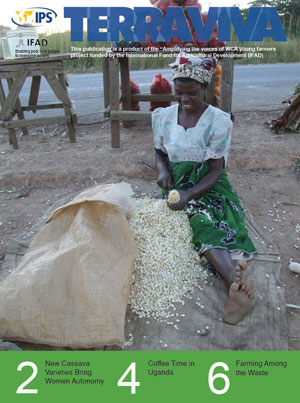Languages
Friday, April 19, 2024
News and Views from the Global South
Africa's Young Farmers Seeding the Future

Restoring Sight to Africa’s Gender-Blind Rice Sector
For more than 20 years, Anastasia Ngwakun from Bamunkumbit village in central Cameroon has been farming rice the hard way – using only hand tools. But Ngwakun knows that if she were a man, she would have access to the technology that would not require her to work so hard.
Malawi’s Failed Subsidy Programme Left Millions to Starve
Gogo Munthali, from Rumphi, a village over 400 km north of Malawi’s capital Lilongwe, dissolves into tears every morning as she worries about what to feed her five orphaned grandchildren, the youngest of whom has full blown AIDS.
Protecting Tanzania’s Farmers from Weather Extremes
When Habiba Msoga from Kiroka village, in Tanzania’s Morogoro Region, first began applying a method of rice cultivation that was different from what her fellow farmers traditionally used, they laughed at her.
Improved Seed Improves Ethiopian Farmers’ Lives

Seeding Ethiopia’s Future Food Security
Datta Dudettu and his seven children know what is like to go hungry. They live in Woliyta, a drought-prone area in southern Ethiopia that has experienced chronic food shortages. But hopefully, thanks to the successful use of hybrid seed, that is now firmly in the past.
Africa’s Farmers Seek Private Money
Africa currently imports almost 40 billion dollars worth of food a year, but it should implement measures to attract private sector investment in agriculture in order to reduce its food import bill and increase its self-reliance, experts in the sector tell IPS.
Slum Farmers Rise Above the Sewers
Tucked deep in Kenya’s sprawling Kibera slum is the shanty that Alice Atieno calls home. It is just one among many small, badly-lit shacks built close together in this crowded slum where an estimated one million people live on about 400 hectares.
Smallholders Feed a Nation as Land Reform Fails
Moses Chiengerere is one of the Zimbabwe’s hundreds of thousands of smallholder maize farmers keeping this southern African nation’s granaries stocked with the grain.
Insuring Ghana’s Smallholder Farmers Against the Weather
Smallholder farmer Suleman Mustapha Simbia, 40, is pleased with the introduction of an insurance initiative called the Ghana Agriculture Insurance Programme. The programme is being implemented in this West African nation to help farmers who had been suffering from loss of income as a result of the bad weather conditions that affect their yields.
In Kenya, Small Is Vulnerable
With the country's food security and farmers' livelihoods at risk from climate change, Kenya has divergent policy options. One is reliant on deploying new technologies as well as improving and expanding use of fertilisers and pesticides; while the other would turn to indigenous knowledge and the country's natural biodiversity.
Oiling the Palms of Cameroon’s Farmers
In Maleke village, western Cameroon, an oil palm tree is considered to be “black gold”. At least, that is what Joseph Tesse, the local processor of oil palm, tells IPS.
What’s Good for Brazil Is Good for Africa
As Africa transforms its economy, it will need modern jobs and increased productivity to fight hunger on the continent, African leaders agreed at a two-day summit.
Q&A: Generating Global Governance to End Hunger
Sub-Saharan Africa may be home to six of the world's 10-fastest growing economies, but it also has a majority of the countries that are suffering from a food crisis.
Bright Ideas Will Help Feed Africa’s Poor
Across Africa, smallholder farmers, who are some of the world’s most impoverished people, are slowly being introduced to innovative approaches, such as entrepreneurial loan schemes and conservation practices, to combat food insecurity.
Ugandan Teen Turns to Poultry to Fight Poverty
When Eunice Namugerwa, an 18-year-old living in Kampala’s Kisenyi slum, decided to start a business to support her family last August, she scrawled three ideas down on a bit of scrap paper: a piggery, a fashion boutique and a chicken farm.
Growing Peas and Greens to Maximise Water Usage
Amid warnings that Kenya’s agricultural water use is surpassing sustainable levels and adversely affecting food security, biodiversity researchers say that agrobiodiversity should be considered as a vital tool to combat this.
Preserving the Soil and Reaping Greater Harvests
Smallholder farmer Peter Mcharo, from Morogoro Region in eastern Tanzania, has a reason to smile. His fields are full of green, healthy maize plants, he has richer soil and he spends less time farming now than he did two years ago.
Malawi’s Maize Shortage Hits Women
Each night Esnart Phiri, a widow with five children, sleeps outside the gates of the state-run maize trader or Admarc market, in Malawi’s capital Lilongwe, as she waits for days on end to buy maize.
Cameroonian Farmers Find Justice in Fair Fruit
The fruit farmers in Njombe, a small town in the coastal Littoral Region of Cameroon, learned a life lesson about “making lemonade out of lemons” - or rather “dried fruit out of fruit” when their land was taken from them by the government and leased to an international farming company.
Green-Fingered Mauritian Farmers Go Green
By Kritanand Beeharry’s side are thousands of watermelon seedlings that he has grown in small pots without the use of chemical fertilisers. As the farmer prepares his half-hectare piece of land in Soreze, near Mauritius’ capital Port-Louis, to plant the two-week-old seedlings, he takes a minute to admire his achievement. “Look at these, they look solid and better grown -- it’s the compost,” he says.
Mozambican Farmers Fear Foreign Land Grabs
Mozambican farmers’ unions believe that soon land will become very scarce for locals as the government leases more and more of it to foreign agribusinesses – thus displacing thousands of rural communities and smallholder farmers with no official title deeds to their land.« Previous Page — Next Page »


















